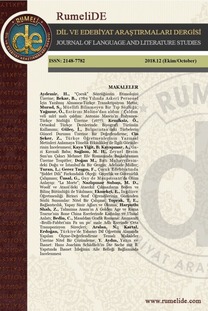بازتاب واقعه عاشورا و قيام امام حسين(ع) در اشعار فارسی: از قدرت يابی صفويه تا دوران معاصر
Reflection of the event of Ashura and the uprising of Imam Hossein (AS) in Persian poems from the power of Safavid until contemporary periods
___
Ahli Şirazi, Muhammed (1344). Kulliyat-ı eşar. Haz. Hami-i Rabbani. Tahran.Ali-Davudi, Seyydi Ali (1357). Mecmua-i Asar-ı Yaghma-ye Jandaqi. Tahran: İntişarat-ı Tus.
Aşık-ı İsfahani (1346). Divan. Haz: Hüseyin Mekki. Tahran: İntişarat-ı Kutub-i İran.
Bîdil-i Dehlevî, Mîrzâ Abdülkādir (1376). Kulliyat-ı Bîdil-i Dehlevî. Haz. Hüseyin Ahi. Tahran: İlham.
Elahi Ghomshei, Mehdi (1379). Nâme-i Hüseynî. Tahran: İntişarat-i Rowzaneh.
Fedai-i Mazenderani (1377). Divan. Haz. Feridun Ekber Shel Darrehi, Tahran
Feyyaz Lahici (1373). Divan. Haz: Celil Asker Nejad, Tahran: İntişarat-ı Danişgah-i Allameh Tabatabai.
Forsat-i Shirazi (t.y.). Divan. Haz. Ali Zerrin Kalem. Tahran: İntişar-ı Sirus.
Homaei, Jalaluddin (1364). Divan-ı Sena. Haz: Mahduht Banu Humaei, Tahran: Neşr-i Huma.
Homaei, Jalaluddin (1369). Makalat-i Edebi. Tahran.
Homay Shirazi (1363). Divan. Haz: Ahmed Keremi. İntişarat-ı Mah.
İbn Manzûr, Muhammed ibn Mukarram (1988). Lisânü'l-ʿ Arab. Beyrut: Dârü İhyâi’t-Türâsi’l-Arabî.
Malek o-Sho'arā Bahār (1358). Divan. Tahran: Neşr-i İlm.
Meftûn-ı Hemedânî (1334). Divan. Haz: Rıza Meftun. Hemedan: Neşr-i Hemedan.
Mesrur, Hüseyin (1338). Raz-ı İlham; Divan-ı Üstad-ı Suhen Hüseyin Mesrur. Tahran: Keyhan.
Minorskiy, V. (1387). İran der Zaman-ı Nadir Şah. Tahran: Dünya-yi Kitab.
Muhaddis-i Horasani, Zehra (1388). Şiir-i Ayini ve Tesir-i İnkılab-i İslami ber An, Tahran, Mücteme-i Ferheng-i Aşura.
Muhammed-Zade, Merziye (1383). Daniş-name-i Şiir-i Aşurai: İnkılab-ı Hüseyni der Şiir-i Şairan Arap ve Acem. Tahran.
Mücahidi, Muhammed Ali (1386). Karivan-i Şiir-i Aşura. Kum: ZemZem-i Hidayet.
Neşat-ı İsfehani, Abdulvahhab (1379). Gencine - Mecmua-i Asar-i Neşat. Tahran: İntişarat-ı Şark.
Nezir-i Nişaburi, Muhammed Hüseyin (1379). Divan-ı Neziri. Haz: Muhammed Rıza Tahiri. Tahran: İntişarat-ı Nigah.
Nir Mumgani, Muhammed Taki bin Muhammed (1359). Divan-ı Ateşkede-i Huccetü'l-İslam Nir. Tebriz: Hatif.
Rafet-i Semnânî (1363). Divan. Haz. Nasrullah Nuh. Tahran: Saziman-i Neşr.
Ruhani, Visal (1319). Gülşen-i Viṣâl. Tahran.
Sabâhî Bidguli, Hacı Süleyman (1338). Divan-ı Sabâhî Bidguli. Tahran.
Saghir Isfahani, Muhammed Hüseyin (1366). Musibetname. Tahran.
Sahibkari, Zebihullah (1379). Seyri der Mersiye-i Aşurai: Tahran: İntişarat-i Aşura.
Sâib -i Tebriz, Miraza Muhammed Ali (1345). Divan-ı Sâib -i Tebriz. Tahran: İntişarat-i Encümen-i Asar-ı Milli. Samani, Oman. Gencine-i esrar. Haz: Muhammed Ali Mücahidi. Kum: İntişarat-i Usve.
Sengeri, Muhammed Rıza (1380). Negd ve Berresi-i Edebiyat-i Manzum-i Defa-i Mukaddes. Tahran: Neşr-i Palizan.
Şahrohi, Mahmud; Kaşani, Abbas Müşfik (1365). Tecellî-i Aşk der Hamasah-i Aşura. Tahran: Üsve.
Şemisa, Sîrüs (1375). Sebk Şinasi der Şiir. Tahran: Firdus.
Tefsiri, Muhammed (1376). Gencîne-i Niyakan ez Firdusi ta Şehriyar. Tahran: İntişarat-ı Majd.
Tusi, Muhammed Kazim (1368). Pertuvi ez Hayat; Mecmua i Eşar Horasan. Neşr Muhammed Kazimi Tusi.
Vahshi Bafqi, Şems el-Din Muhammed (1388). Divan-ı Vahshi Bafqi. Haz: Hüseyin Azeran. Tahran: İntişarat-ı Emir Kebir.
Visâl-i Şîrâzî (t.y.).Divan. Haz: Muhammed Abbasi. Tahran.
Yaghma-ye Jandaqi (1357). Divan. Haz: Seyydi Ali Ali-Davudi. Tahran.
Zerrînkûb, Abdulhüseyin (1363). Seyri der Şiir Farsi. Tahran.
- ISSN: 2148-7782
- Yayın Aralığı: 6
- Başlangıç: 2014
- Yayıncı: Yakup YILMAZ
Edirne Valisi Ahmed İzzet Paşa Divançesi
Yazın çevirisi incelemelerinde yorumlayıcı çeviri kuramı
Dünya edebiyatı ve izdüşümü: “Tercümedya”1
Gender, meta-discourse and stylistic appropriateness in English writing
Cerrah Mehmed’in tıbba dair risalesi
Türkçe eğitiminde eleştirel dinlemenin/izlemenin önemi ve yeri
Kavramsal metafor kuramı ve belagat: karşılaştırmalı bir inceleme
Ahmet Naim ÇİÇEKLER, Timur AYDIN
